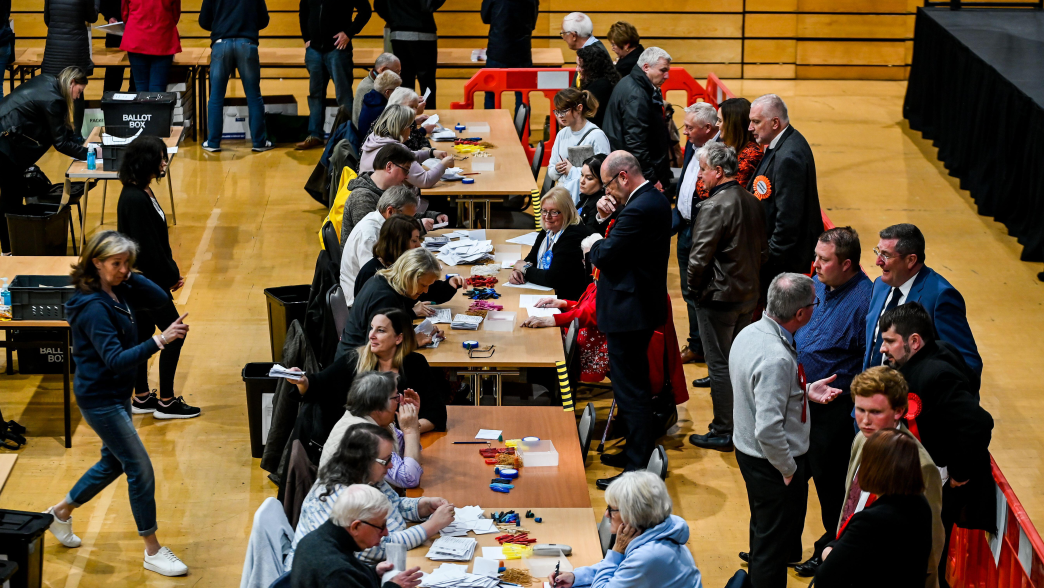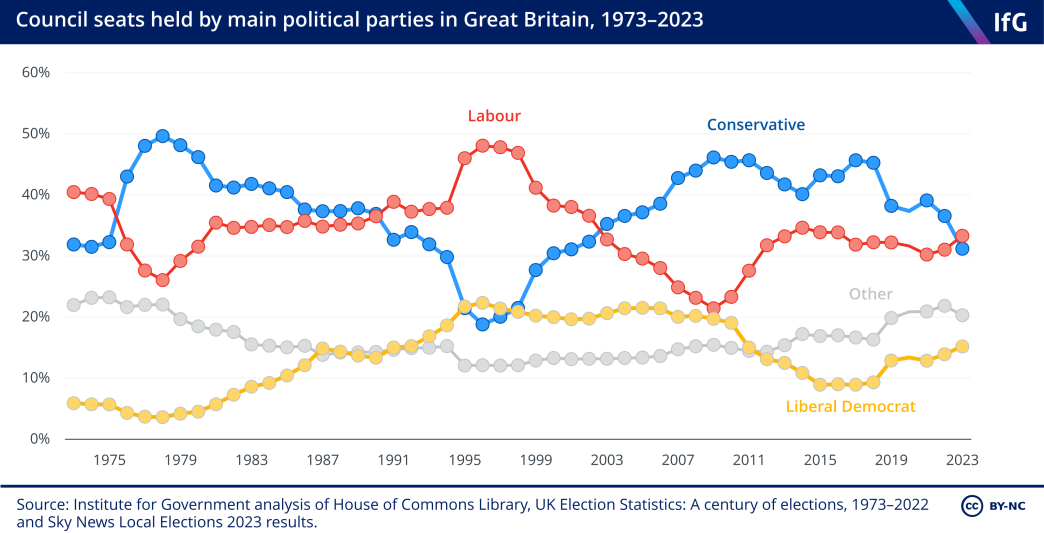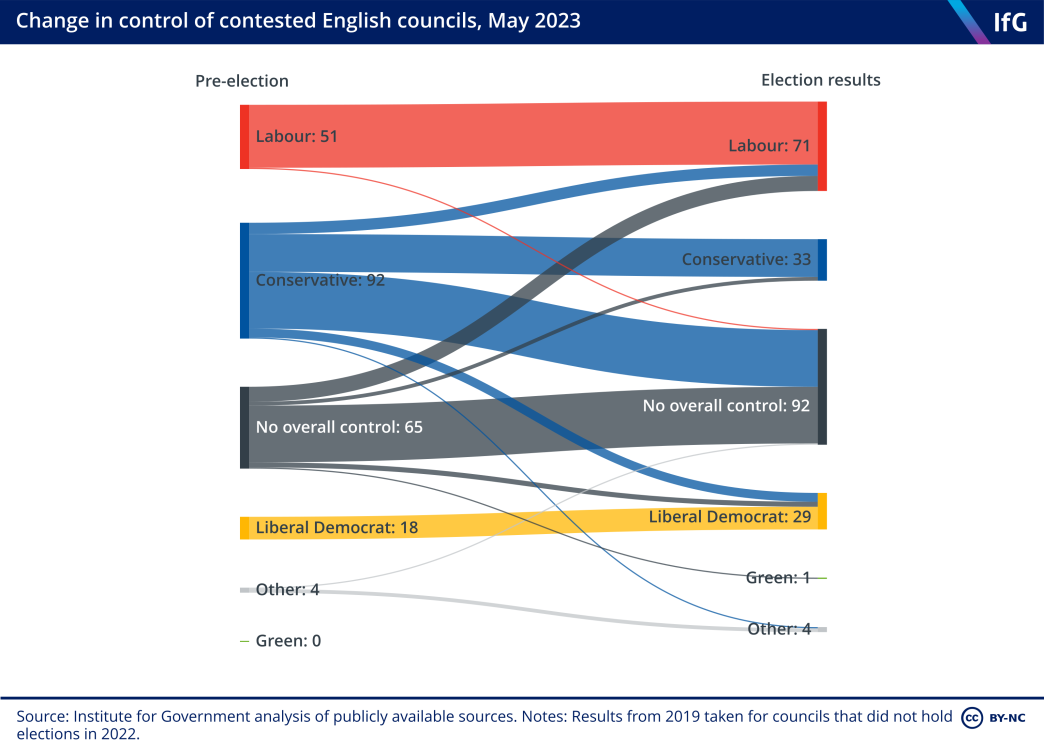Local elections: four things we learned
Peter Hourston looks beyond the headlines to identify four key takeaways from the 2023 local elections in England.

4 May was a bad night for Rishi Sunak and a good one for Keir Starmer, but Peter Hourston looks beyond the headlines to identify four key takeaways
The local elections in England saw the Conservatives lose over 1,000 councillors, Labour become the largest party in local government in Great Britain for the first time since 2002, the Liberal Democrats make impressive gains in the south, and the Greens take majority control of a council – Mid Suffolk – for the first time. Beyond the headlines, here are the four things we learned from last week’s results.

Rishi Sunak must respond to worse than expected results for the Conservatives
Conservative party chairman Greg Hands had widely predicted that “it was likely that the Conservatives would lose 1,000 seats”, but his expectation management fell short: the party lost 1,063. Number 10 must be tempted to respond with a frenzy of policy announcements and interventions to show Rishi Sunak is on the political front-foot – but filling the Number 10 grid is easy; making demonstrable progress on tackling long-term policy challenges is not. Sunak’s post-election speech on increasing the use of pharmacists in primary care is an example of this. The plan does not address the workforce problems faced by general practice; tackling public sector strikes would be a more effective way of cutting NHS backlogs than allowing pharmacists to prescribe some medicines.

The local election results do not guarantee a Labour majority in the next general election
Keir Starmer was quick to argue the local election results show his party is on course for a Commons majority, but the numbers don’t necessarily translate. Matching its lead of 7-9 percentage points over the Conservatives in the national vote share in a general election would make Labour the largest party in the House of Commons, but leave it short of a majority.
But reading across from local elections to general elections should be approached with caution. Starmer’s hope is that Labour will hoover up some of the 35-40% of the votes cast for the Liberal Democrats, smaller parties and independents, while turnout in local elections is about half that for a general election. Labour’s vote is disproportionately younger and less inclined to vote in local elections, so it could benefit from higher turnout. However, given the unexpected nature of recent general election outcomes, these results serve as a reminder that all parties – as well as the civil service – should be preparing for possible hung parliament scenarios.
Difficult local elections results should not diminish the Conservative party's commitment to devolution
Although no metro mayors were up for election last week, this year’s local elections were still important for devolution within England. Conservative Tees Valley metro mayor Ben Houchen will likely face Labour led councils in Middlesbrough, Hartlepool, Darlington, and Redcar and Cleveland. Labour also became the biggest party in Derby City and retained its majority in Nottingham City, which could also influence ratification of the new East Midlands devolution deal.
With Labour now the largest party in local government, there is a risk that these elections will dampen Conservative support for devolution. The government should recommit to the devolution framework in the levelling up white paper and be prepared to work with Labour and Liberal Democrat councils with devolution ambitions. The first devolution deal, signed by then Conservative chancellor George Osborne, was in Labour dominated Greater Manchester, showing that politicians can work across party lines in this area.
Voter ID must not overshadow important electoral system reforms
The introduction of mandatory voter ID in England gained significant attention in the election campaign. But an equally important – but much less discussed – change in the Elections Act 2022 was the move to first past the post (FPTP) for council mayor, metro mayor, and police and crime commissioner elections. Candidates are more likely to be elected with a low vote share under FPTP.
Past IfG research has shown that the partnership model of combined authorities requires metro mayors to work collaboratively with their constituent council leaders. So mayors elected with narrow margins will need to remember the importance of reaching across the political divide in their council or combined authority. This is particularly important in single county devolution deals, where county councils are being offered extra funding and powers by moving to the directly elected mayor model. The Conservatives won the Bedford mayoralty by only 145 votes last week despite holding only 14 out of 46 seats on the council – a scenario that could likely face new leaders in county deal areas such as Norfolk and Suffolk.
- Topic
- Devolution
- United Kingdom
- England
- Political party
- Conservative Labour Liberal Democrat
- Position
- Metro mayor
- Administration
- Sunak government
- Public figures
- Rishi Sunak Keir Starmer
- Publisher
- Institute for Government